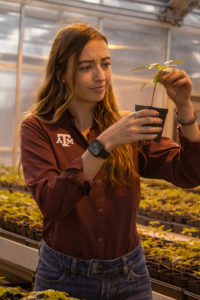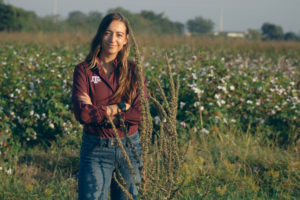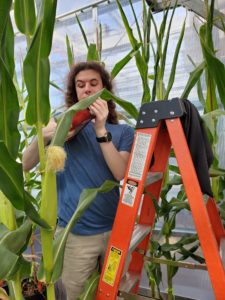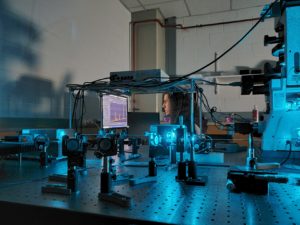Two Aggies among 2020 cohort for national fellows program
Farber, Kezar named to Foundation for Food and Agriculture Research 2020-2023 cohort
Two students from the College of Agriculture and Life Sciences at Texas A&M University were named fellows in the 2020 Foundation for Food and Agriculture Research (FFAR) Fellows Program.
Charles Farber, Department of Biochemistry and Biophysics, and Sarah Kezer, Department of Soil and Crop Sciences, are two of 23 fellows selected nationally. .
The program, led by the College of Agriculture and Life Sciences at North Carolina State University, is a three-year program tailored to doctoral students whose research is in alignment with FFAR’s six challenge areas. Funding and mentorship are available for those with research in the areas of soil health, sustainable water management, next-generation crops, advanced animal systems, urban food systems and health-agriculture nexus.
Charles Farber
Farber, pursuing his doctorate under the guidance of Dmitry Kurouski, Ph.D., assistant professor in biochemistry and biophysics, is utilizing Raman spectroscopy to assess the overarching question of how to feed the world.
“My research examines using Raman spectra obtained from plants to develop statistical models that predict the health/stress status of the plants. In essence, we shoot lasers at plants to see if they’re feeling bad,” Farber said.
Farber is looking at alternative approaches to addressing this global issue of feeding the world by focusing his degree on the applications of Raman spectroscopy for the analysis of plants.
Throughout the fellow’s program, students are paired with industry partners as a source of funding and mentorship.
“One of the most important parts of the fellows program for me is the idea of establishing connections, both with members of industry and other fellows around the country,” he said. “I would like to see my lab’s primary method, Raman spectroscopy, established as a regular tool in agriculture. Being able to share these ideas with industry leaders and other scientists will help further that goal.”
Following his doctorate, Farber plans to pursue a career as a research scientist for an agricultural company.
“I see myself potentially driving the application of the Raman spectroscopy method for plant analysis for these firms,” he said. “I am also interested in teaching people how to use equipment and troubleshooting, so I may alternatively pursue a career as an application scientist.”
Farber’s research aligns with two of FFAR’s six challenge areas. Raman detection of plant traits at the seed stage enables rapid software-driven seed selection, accelerating the development of next generation crops. The power of Raman to identify the nutrient content of fruits and vegetables from a quick scan allows the technology to additionally contribute to the health-agriculture nexus objective, he explained.
“Charlie’s research is critically important to develop digital farming in the U.S.,” said Kurouski. “This modern agricultural concept aims to maximize the crop yield without the expansion of agricultural territories. Charlie’s work demonstrates that timely detection and identification of plant diseases, one of the key aspects of digital farming, can be achieved using Raman spectroscopy.”
Within only three years of his doctorate, Farber has published 12 papers in top peer reviewed journals and also won numerous national and international awards, making his graduate work exceptional at Texas A&M and nationwide, Kurouski said.
“I’m very proud to have such an organized and productive student,” Kurouski said.
Sarah Kezar

Kezar is studying for her doctorate in weed science under the guidance of Muthukumar Bagavathiannan, Ph.D., in the Department of Soil and Crop Sciences at Texas A&M. She is looking to understand and develop integrated management tactics for minimizing weed seedbanks and thwarting the evolution of weed resistance to herbicides.
“The FFAR Fellowship will equip me with a foundation in teamwork, communications, project management and leadership skills to successfully build upon the findings of our predecessors to ensure both food security and a sustainable ecosystem,” she said.
Kezar’s research reaches two of the six challenge areas presented by FFAR, including sustainable water management and soil health. Her doctorate focuses on the herbicide-resistant weeds and addressing their impacts on the cotton industry. Specifically, she is looking at seedbank management of Palmer amaranth, the most problematic herbicide-resistant weed species in U.S. cotton, that directly affects soil and water conservation.
“Conservation tillage programs have tremendously contributed to soil and water conservation over the past few decades, but the surge of herbicide-resistant weeds and the growing trend in reverting back to tillage for controlling resistant weeds is severely threatening conservation agriculture,” Bagavathiannan said.
“Palmer amaranth is reported to have developed resistance to eight different herbicide modes of action in the U.S. We have confirmed populations with three-way resistance in Texas. Loss of herbicide options due to weed resistance is a severe threat to the sustainability of cotton.”
Heavy reliance on a few selected weed management options is a prime driver for weed resistance. As part of the Beltwide research project, Kezar is collaborating with Texas Tech University, the University of Arkansas, and North Carolina State University, in testing and implementing various diversified management options to effectively tackling this pest.
“Our research question is to discover the value of different combinations of integrated strategies for minimizing the number of Palmer amaranth escapes in cotton and reducing seedbank addition from them, which will greatly compliment and help improve the longevity of available herbicide tools,” she said.
Kezar and her team are also investigating unique ways of reducing viable seed production from Palmer amaranth plants that escaped herbicides, thereby reducing the chances that resistance can build up through seedbank replenishment and perpetuation.

The outcomes of this project are expected to help suppress long-term population growth of Palmer amaranth, reduce weed control costs, and improve economic and environmental sustainability of cotton production in the U.S.
“While Palmer amaranth resistance to glyphosate and other herbicides is rapidly spreading, effective weed control is still possible with the use of multiple tactics,” she said.
“Sarah has an excellent background in agronomy and is off to a great start with her Ph.D. program. I congratulate her on winning this prestigious award and look forward to making a positive impact on the U.S. cotton industry through her research,” said Bagavathiannan.
For a full list of recipients, see the original press release provided by FFAR.




